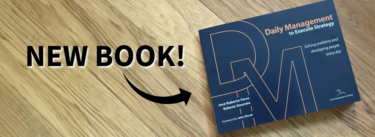We had been working with a team of people who were somewhat jaded about the possibility of change. Their trepidation seemed to fade a bit as we worked through our process mapping, and the team members became more open to sharing their frustrations. Eventually the group was able to identify potential solutions to some of the bigger problems and were ready to share their ideas with the management team. Sounds good, right?
Yes it was….until the moment when upper management shared its feedback: “Other priorities are more important than implementing these ideas,” they said. And: “Some of these ideas have been tried before and were unsuccessful.”
My stomach sank as I watched these employees became deeply disillusioned, frustrated, and unlikely to participate in future changes. They realized the long odds of anyone taking their ideas forward. For me it was like watching an accident in slow motion.
How did this happen? The people who were in a position to agree to the changes, were in fact barely involved with the process improvement work related to the ideas generated by the employees.
And I realized yet again that what’s not always clear to everyone, is that it does more damage than good if you ask people for their ideas and then don’t carefully tend to them.
Tending to ideas doesn’t require you to say yes, but it does mean that you have to treat the person who shares them as if you truly carethat they’ve offered their thoughts. It also means being careful not to ask for suggestions when you don’t have a mechanism for addressing, managing, and utilizing them.
In general, the damage that improvement efforts can do to a culture is rarely discussed before the problems happen. Problem-solving activities that surface ideas need to be encouraged only when there is a leadership team ready to effectively respond to the ideas.
Often, this misuse occurs without a lot of thought. It’s not malicious; simply an outcome that results from failing to pay attention. It comes when there is not an effective response to employee suggestions.
Ineffective responses can look like:
- Dismissing an idea
- Not stopping what you’re doing to listen
- Saying “Here’s why that won’t work”
- Saying “We’ve done that before”
Regardless of intent, employees take this as a sign of disrespect and disregard. In asking teams how they feel when this happens, they invariably state that they feel offended, hurt, and disillusioned; among other negative emotions.
In my work I’ve observed four productive ways to tend to people’s suggestions with respect and care:
If you’re too busy to listen now, schedule a different time to review their thoughts. Employees that have sworn off giving suggestions, often gave up after a manager didn’t take the time to listen because they were distracted with other responsibilities.
Respond in a thoughtful manner. Consider asking questions to better understand the idea. Fully communicate your appreciation for the idea. If the idea is not feasible, be mindful of how your response will either encourage the person to suggest ideas in the future or cause them to keep it to themselves next time.
Seek ways to utilize some aspect of their suggestion.When that happens, the first thing you can do is ask more questions about the idea. There may be another fruitful thought within their suggestion, so try something like “tell me more” or “what else do you think?” to show respect and tease out those potential gems. Even when ideas aren’t feasible, you can often find some aspect of their suggestion to thread into an action plan. Just remember to be detailed and gentle when you explain this.
When improvement efforts are designed to surface ideas, ensure the leadership team is ready and willing to effectively field the ideas.Beyond just improvement efforts, it’s optimal to ensure that everyone in leadership roles is skilled at responding to ideas effectively. Most managers confuse the topic of handling suggestions with approving them. Caring for ideas does not necessarily mean approved, but the goal is to treat all ideas with care and respect.
If lean activities are doing damage to the fabric of your organization, you need to find a way to change this dynamic.
The key is to be vigilant about tending to team members’ thoughts whenever they offer ideas. Check to see if there are problem-solving teams raising ideas, suggestion boards, or other mechanisms throughout your organization, and find out how they’re being supported. I always consider any idea as a precious and valuable asset that must be protected
If you want to receive any more suggestions, ensure that the people offering them know that you’ve heard them and are considering what to do. Feeling disrespected leads to disengagement, and no organization wants that.
How does your organization handle suggestions? Do you provide training for your leadership team on how to effectively respond to employee suggestions?





